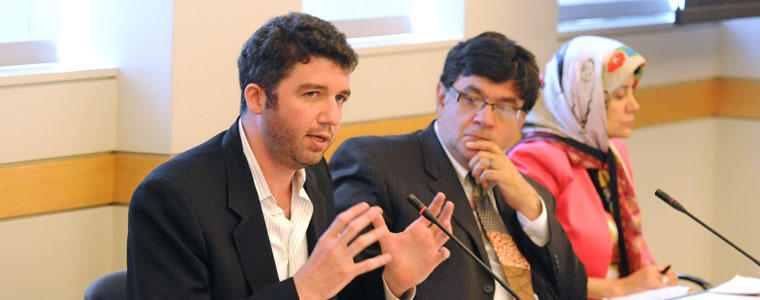USIP Meeting Examines Iran’s Post-Election Politics
Iran’s June 14 presidential election, with its surprise, first-round win for the most moderate candidate in the officially approved field, demonstrates that Iranian politics and support for reform remain vibrant despite the right wing’s hold on power in recent years, a panel of experts said at a July 15 meeting at the U.S. Institute of Peace (USIP).

“Iran has real politics that are worth taking a look at,” said Daniel Brumberg, a USIP senior program officer and specialist on Middle East politics and democratization.
The Iran panel was drawn from USIP’s Iran Study Group, an initiative that Brumberg said was launched 2 ½ years ago with nine scholars. Their aim has been to assess the strength of trends in Iran’s various political arenas, including universities, parliament and the reformist Green Movement. USIP is planning to issue an overview report on the group’s research. But in an advance indication of the Study Group’s findings, Brumberg suggested that the 2013 election could be “a basis for a reopening of the political sphere” in Iran.
Brumberg said the election of Hassan Rouhani, a Shiite cleric who has served as Iran’s nuclear negotiator and as secretary of Iran’s National Security Council, reflects the durability of the “diversity of opinion within an authoritarian system” and of the country’s civil society. For U.S. policy, he described “a window of opportunity that has opened up” in light of Rouhani’s forthcoming presidency, as long as U.S. policymakers can clarify what result they are seeking in future nuclear negotiations between Iran and key international countries, including the United States. Iran is at loggerheads with the international community over its nuclear programs, which have prompted an array of sanctions from the United States and many other countries, as well as the United Nations Security Council.
Farzan Sabet, a Study Group member and a doctoral student at the Graduate Institute of International and Development Studies in Geneva, reviewed political trends and divisions among Iran’s recently dominant conservative movement, particularly the Islamic Revolutionary Guard Corps (IRGC). He said the IRGC remains “the most powerful political actor in Iran” and a key player in blunting the aims of the country’s last reformist president, Mohammad Khatami, in the late 1990s. (In Iran’s complex theocratic system, the most powerful position is that of Supreme Leader, a post currently held by Ali Khamenei.)
Sabet, speaking on a Skype connection from Geneva, called the 2013 election a “devastating defeat” for the IRGC and an event that shows its political rise “is in no way inviolable and irreversible.” Said Sabet, “The IRGC remains dazed and confused over the election outcome,” though it is likely to confront Rouhani in the future. The Rouhani victory, he and other panelists suggested, stemmed in part from the splitting up of popular support for conservatives among at least three candidates, as well as the coalescing of moderate and reformist support around Rouhani. He was endorsed by both Khatami and by another former president, Akbar Hashemi Rafsanjani.
Kevan Harris, a postdoctoral research associate at Princeton University who was in Iran during the election, said the vote suggests that the IRGC is unable to control its rank and file of regime loyalists. He said that Iranian news media coverage of the race, though not free of state control, reflected considerable competition among media outlets. He called the result an “implosion of the right wing,” adding, “This election was an accident. It could have gone a lot of different ways.”
The harsh conservative crackdown on protestors contesting the 2009 presidential election—widely viewed as a fraudulent outcome that returned hard-line President Mahmoud Ahmadinejad to power—did not deter their opponents from becoming politically active once again this year. Indeed, said Harris, unlike in 2009, the reformists and moderates decided to be “ruthlessly pragmatic” by putting aside differences and forming an alliance to back Rouhani, a regime veteran who is seen as inclined to be active in economic reforms and in attempting to improve relations with the West. That pragmatism was furthered by the Khatami and Rafsanjani endorsements and “created a wave of participation,” said Harris.
Another Study Group member, Fatemeh Haghighatjoo, agreed that the election “may lead to more political opening and accommodation.” The practical coalition behind Rouhani, she said, decided “not to be radicalized” and “to grab the limited opportunity they had.” Haghighatjoo, a leading reformist former member of Iran’s Majlis, or Parliament, and now head of the Massachusetts-based Nonviolent Initiative for Democracy, said that Rouhani will try to end Iran’s political isolation, and as a regime veteran (including on the Islamic Republic’s powerful Expediency Council) he may have better ideas on how to do so within the Iranian system. She also suggested that the supreme leader, Khamenei, likely sees the election result as a helpful way of demonstrating the system’s legitimacy.
Haghighatjoo argued that the election result means the United States now has “a great opportunity”: If Washington shows good will toward Iran by reducing sanctions, she said, it would strengthen the hand of democratic forces inside of the country. At the same time, she cautioned, the Rouhani win does not necessarily mean that Iran will change its basic approach to the longstanding nuclear dispute.



